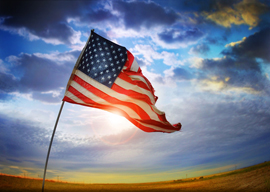
July 04, 2012

Every Fourth of July, a heretical question nags: Would it have been so bad if America hadn”t won its independence from Britain?
This is not a popular topic among Americans, who invest everything about independence with transcendent import. We”re not happy merely saying that the Revolution was started by men who felt they had what it takes to rule themselves and who turned out to be right. Today, we want America to be both unique and a role model for the world.
Still, the most straightforward way to evaluate this question is by considering our neighbors” contrasting histories. The Mexicans followed America’s lead and liberated themselves from Spain with their decade-long War of Independence, which began just over 200 years ago.
In contrast, Canada is the spiritual home of the losing side in the American Revolution. About 40,000 United Empire Loyalists from the 13 colonies evacuated to Canada at the end of the War of Independence. Hence, while America evolved politically along the patriots” Whig lines, Canada’s partisan DNA was essentially Tory. Loyalist Canada had to be more or less prodded by Westminster into independence over many generations, like an adult child who cautiously moves from his bedroom in his parents” house to their basement and finally to their garage. Officially, Canada’s Constitution wasn”t “patriated“ until 206 years after our Declaration of Independence.
Yet how much real difference did the very different political paths of America and Canada make in the long run?
Whose daily lives are more different from Americans”: Mexicans” or Canadians”?
On a vacation in San Diego when I was about six, my family took a day trip to Tijuana. My main recollection is that this Mexican border town’s economy was intensely donkey-centric. Numerous street corners featured donkeys with cardboard signs inveigling tourists to “Have your picture taken with a donkey.” One entrepreneur had painted white stripes on his donkey: “Have your picture taken with a zebra.” Although I nagged my parents for a picture of me riding the faux zebra, when back north of the border I concluded, “Thank God I was born in America.”
A few summers later, however, we drove up to Seattle and then took the ferry to Vancouver. As a firm believer in what’s now called American exceptionalism, I was prepared to scoff at Canada’s puny might. Nonetheless, Vancouver turned out to be pretty cool.
Similarly, in 1994, I flew on business from home in Chicago to Toronto. The main difference between the two greatest Great Lake cities appeared to be that most people in Toronto drove in the daytime with their headlights on as if headed to a national funeral. (Had Wayne Gretzky died?)
This is not to say that Canada is boring. In some ways, its history has been more tumultuous than America’s. For example, Newfoundland was a separate dominion of Britain until 1949, and Quebec came within about a percentage point of voting to secede in 1995. (If you like placid history, read up instead on Australia’s, where a central theme was the evolution of the right to have weekends off.)